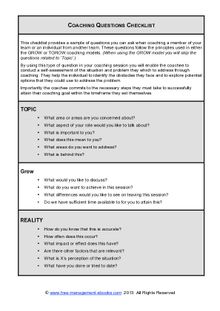Coaching Questions Checklist
 PDF
PDF
This Coaching Questions checklist provides a sample of questions you can ask when coaching a member of your team or an individual from another team. These questions follow the principles used in either the GROW or TGROW coaching models. (When using the GROW model you will skip the questions related to 'Topic'.)
By using this type of question in your coaching session you will enable the coachee to conduct a self-assessment of the situation and problem they which to address through coaching. They help the individual to identify the obstacles they face and to explore potential options that they could use to address the problem.
Importantly, the coachee commits to the necessary steps they must take to successfully attain their coaching goal within the timeframe they set themselves.
You can use a question to prompt the coachee to look for a new idea or solution that would not have occurred to them otherwise. It is important to point out that the idea may not have occurred to you either. Through the use of questions you may encourage the coachee to come up with something completely novel.
Questioning offers you the opportunity to persuade your coachee to consider the potential problems that might result from a particular course of action. Finally, allowing the coachee to develop the idea themselves means that they are much more likely to commit and follow through a course of action.
This is because they have a much greater sense of ownership of and commitment towards the actions when putting them into practice. The skill in coaching is knowing when and how to use different types of questions to maximize your effectiveness.
Download "Coaching Questions Checklist.pdf"



 PDF
PDF
 PDF
PDF